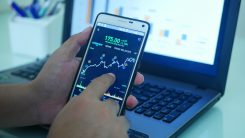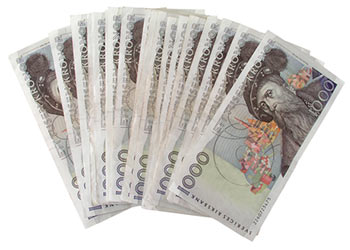Trade forex online
Here is a guide on trading currencies, which can normally be combined with several other types of online trading.
As a trader, you also get the opportunity to buy and sell commodities CFDs or shares (buy or short sell), in addition to pure forex trading. Some sites that offer currency trading also provide the opportunity to trade crypto, but in the UK that is always without any leverage.
Here we discuss how to trade currency online, where you can get started. A number of frequently asked questions can also be found at the bottom of the page:
Table of Contents: Overview
- 1 How and why are currencies traded?
- 2 The 3 most common strategies when trading currencies
- 3 Swing Trading: Take advantage of resistance and support levels
- 4 Position trading: Long-term and lower risk
- 5 Scalping: Addresses the fight against incorrect pricing in the market
- 6 Carry trading: Earn interest every day
- 7 How much to deposit?
- 8 Fequently asked questions when trading currencies
How and why are currencies traded?
Forex trading is the art of buying and selling currencies. Currency trading can practiced by a lot of different participants – from banks, central banks, multinational companies, trading companies, along with long and short term individuals and investors.
Currency exchange and trading can take place for a variety of reasons, such as to make money as a day trader, to protect assets, minimise currency risks and might be required to handle international trade.
Then, of course, there is also speculation and more short-term and often more technical ways of trading currency. Trading can be done through forex brokers such as the innovative Skilling or the “think less approach” with copytrading from eToro.
The 3 most common strategies when trading currencies
As always, there are many different opportunities and strategies that can be used to get a good return. Here are some of the currency market’s most popular methods that really work, both short-term and long-term!
Swing Trading: Take advantage of resistance and support levels
Those who trade currency with swing trading often look at their trades relatively short-term. They base their buy and sell levels on taking many small gains, closing bad trades faster and holding on to currencies for a shorter period of time. If you see a currency pair that has reversed its support level several times, they may be in a position to buy again when the currency hits the support level again. The same strategies can be used for resistance, currency pairs that start from a range or that start to bounce over a “moving average” indicator.
Advantages: You do not have to quit your full time job to become a swing trader. There are plenty of opportunities if you are a little patient.
Disadvantages: There is an interest rate risk every night, so try to go into currency pairs that have a positive interest rate. You can not run on really long trends as a swing trader.
Position trading: Long-term and lower risk
As a “position trader”, you have a longer trading horizon where a trade can be active for weeks or months.
Advantages: You do not have to spend so much time every day, because your business is long-term, which usually makes it less stressful because you do not care about short-term price changes. You are often given a favorable level of risk-reward for your business, often a 20% benefit or more.
Disadvantages: Requires a good insight into the fundamental and technical factors that affect a certain currency pair. May need larger capital invested to maintain a broader stop-loss.

Rating: 9.78/10
Minimum deposit: 50 GBP
Description: Get inspiration from the markets’ best traders for free! Discover the worlds’ best social forex trading site.
Risk warning: 68% of private investors lose money when they trade CFDs with eToro.
Scalping: Addresses the fight against incorrect pricing in the market
One of the most misunderstood trading strategies is scalping, perhaps the most short-term strategy, which is banned by some forex brokers. An average currency scalping trader often sits no more than 30 seconds to 5 minutes in one position, but does more trades instead. A scalper tries to find incorrect prices, too low or too high. Another way to look at it is that scalping traders go in at the right position. When a currency is oversold or underbought, you go in and take a position for a short period. The goal is to succeed in reaching 10-50 pips (points) before leaving a trade.
Advantages: Can provide full of opportunities in your trading every day, which can give you a decent side income or full-time job if you get started for real.
Disadvantages: The main disadvantage for humans compared to robots is that humans can not trade currency as fast as an automated robot. It can also be risky with scalping if you do not have a very low spread with your currency broker, because it can eat up a large part of the profit.
Carry trading: Earn interest every day
Similar to going into stocks that pay high dividends, you can trade currencies with a positive interest rate difference. All forex trading with CFDs, spot or ETFs means that you either receive an interest expense or interest income, every day that a trade takes place. If, like many long-term traders, you invest in shares with a good share dividend, you can do the same when trading currencies. The phenomenon is called carry trading and means that you sell a currency pair whose country has a low underlying interest rate, while you invest in another currency with a significantly higher interest rate.
Advantages: Can make money on interest every day. Can go in and out rather quick.
Disadvantages: It is not always as these currencies go plus exactly when one desires.
How much to deposit?
Here are some suggestions about various account types for trading and some about the positive with each type of trading account.
Trade currency from 50 GBP (First deposit)
Even from really professional sites like eToro, you can get started with as little as 50 quid. But because the markets move so fast, we never recommend you invest less than SEK 500 on a first deposit, when you get started.
But a five hundred to test a little how the markets for currency and stocks work, is a low amount of money for most people. At the same time, it’s not too much to get started. So what are you waiting for? Try with at least SEK 500 for the first time. Read more about eToro here or if you rather get started with a demo account – try it here!.
Trade currency from 100 GBP
For more long-term currency trading, it is wise to invest a slightly larger amount. When you reach at least 100, you have a little more stable leg to stand on when it comes to leverage, which makes it possible to trade currency in the longer term – even if a bit more would be a good start. Sites like Skilling have a good base for long-term investors, who want to trade currencies, international stocks and invest through ETFs and stock indices through CFDs. You need to deposit at least 100 GBP to open an account with real money, but you get in return access to many smart tools for automatic analysis using technical analysis. What are you waiting for? Open a demo account with the user friendly Skilling today!
Trade currency from 250 GBP or more
For even more advanced forex trading, lower spreads and better terms – you should put in 250 GBP or even quite a bit more. Then you can become a VIP customer over time, which means that the currency brokers take extra good care of you. Normally, you get your own account manager and support, who can give you advice on how to succeed even better with trading currencies and stock CFDs. Our favourite with flexible leverage, lots of customisation options and the widest range of instruments is Capital. You can try out Capital with a demo account here!
Get started easily: Trade forex from your mobile!
As little as 5 years ago, there was hardly the opportunity to shop from a mobile phone. Today, it is more or less standard for online forex traders. You always have your mobile with you and in this way it is by far the best platform. In principle, all sites today have a mobile site and larger trading companies normally also have an app.
How has the market for currencies developed over time?
Before the world’s first currencies were released, commodities were often used as money, including copper and gold. King Alyattes of Lydia, present-day Turkey, created the world’s first coin around 600 BC, with a lion as its main symbol.
China was by far the first to launch paper banknotes, which took place as early as the 6th century during the Tang Dynasty.
How to start trading currency pairs?
The first thing that should be done is to choose a relevant forex broker. Then you choose currency pairs to trade. Our recommendation is to deal with the largest and most liquid currency pairs, such as EUR / USD and JPY / USD, or GBP / USD.
What affects countries’ exchange rates?
Inflation, growth, government debt, trade balance and expectations of a country’s economy are important reasons that affect exchange rates. Another significant factor is political stability and, finally, speculation can also affect exchange rates.
Which are the biggest currency pairs to trade?
The largest currency pairs in the world for trading are USD/EUR, followed by JPY/USD and GBP/USD. The British pound is one of the 5 big currencies in the world and it is traded heavily against EUR, USD, JPY, CAD and AUD.
What different ways can you trade currencies?
There are three common and accepted ways to trade currencies during 2021 and forward. The most common is through spot CFD trading, which is with immediate delivery. By the way, futures (“futures” in English) with future delivery dates are an option, or currency options.
How do I become a currency trader??
Start learning about the foreign exchange market to get started. A good start is through our school.
Fequently asked questions when trading currencies
Here are some of the most common questions we have received.
Is it profitable to trade currency?
Many people ask if currency trading is something that really makes money and is profitable? Like everything in the world, it depends on your goals, strategies and focus. If you take the time to discover profitable strategies for currency trading, it will be an exciting journey. One proposal is to set up automated currency trading, using robots. But nothing goes overnight. You get to spend some time every day and read, learn and last but not least – train. Training is most easily done with a test account that all serious online trading platforms offer today, completely free of charge. Get started with a demo account right away and discover currency trading online!
Do you have 5 simple tips to follow as a beginner in forex trading
+ Practice on a demo account before investing real money.
+ Try several different strategies and methods to succeed in trading currency successfully. It is not always the first method that works best, but in the long run there are very many who become incredibly successful without any major prior knowledge. But of course it requires that you read on and experiment to see what works for you!
+ Focus on one instrument at a time! But do not limit yourself to just trading in currency, also discover short selling of stocks which with 5x mortgaging can be very beneficial.
+ Be consistent and stick to a plan. Then you can more easily evaluate and decide what is right for you over time.
+ Do not bet more than you can afford to lose as a newcomer.
What times of the day can currency be traded?
Unlike stock trading, the foreign exchange market is open around the clock. You can start trading any currency pair at 9am, Sydney time, on Monday morning. This corresponds to 01.00 at night in Stockholm. After Australia’s foreign exchange market, Tokyo opens an hour later. After that, trade will really start as Hong Kong and Singapore also open. The largest hub for currency trading is still London, but that may change in the next few years thanks to Brexit. Incidentally, New York is also a big hub, but the time difference means that the city has a disadvantage against Europe and Asia, as the offices close earlier due to the time differences. But anyway, currency trading is possible from Monday morning to Friday night, when US offices close. So it is 5 days in a row that the market is open, heaped around.
I want to learn how to trade currency. How should I do??
It is important to practice so start reading our reviews, decide on a currency broker and register for a demo account. You can also read our comprehensive guide, the currency school, to discover more.
3 reasons not to trade currency??
+ You don’t have at least 100 GBP to live without. That’s what it costs at Skilling to get started.
+ You do not want to discover anything new. Many people are actually amazed at how easy it is!
+ You can not handle “free money” by borrowing. You have to be careful, so you do not maximize the loan but rather borrow as little as possible. Just like with all types of loans.
Another tip is to read some books to get inspiration for the trade. The three best books on currency trading online are probably:
–Currency trading for dummies: An American book that goes through everything you need to know to get started trading currency as a beginner. Everything is taken up on a reasonable level, so that you can easily get into the most important things to think about right from the start. More or less a must for anyone who wants to trade currency seriously.
–How to start a trading business from $500: If you have just over 500 GBP to risk on forex trading, this is a good guide to get started with. Many new forex traders do not have much capital to invest in the beginning and then it is extra important to learn what a real trader has to teach. Here you get tips on how to become a disciplined trader, who is careful and builds up his capital over time with the help of smart strategies and habits.
–Technical Analysis of the Financial Markets” by John J Murphy: An exhaustive book on trading methods and applications for you who want to know all the fundamentals of technical analysis. Here you will find over 400 stories from real life about basic things like trends, price patterns, methods of analysis and ways to keep track of money when trading currencies.
Do you want to know more? Check out our guide here.









